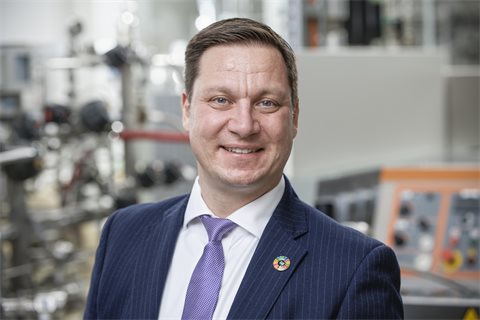Prof. Dr. Thomas Brück

Vita
Thomas B. Brück
1. CV
Family name Brück
First name Thomas Bartholomäus
Date of birth 27 September 1972
Place of birth Cologne, Germany
Nationality German
Marital status Married, 2 children
Work address Technical University of Munich, Department of Chemistry, Werner Siemens-Chair of Synthetic Biotechnology, Lichtenbergstr. 4, 85748 Garching, Germany
Telephone +49 89 289 13253
E-mail brueck@tum.de
Private address Gfällach Str. 1, 85452 Moosinning, Germany
Homepage http://www.wssb.ch.tum.de
Research
2018-present Full Professor, Werner Siemens-Chair of Synthetic Biotechnology, Technical University of Munich, Garching, Germany
2011-2017 Associate Professor, Industrial Biocatalysis, Technical University of Munich, Garching, Germany
2008-2011 Portfolio-Manager Technologies and Patents, Süd-Chemie AG, Munich, Germany
2006-2008 Head of Assay and Application-Development, Süd-Chemie AG, Munich, Germany
2006-2011 Visiting Assistant Professor in Marine Biotechnology, Florida Atlantic University, Boca Raton, U.S.A.
2004-2006 Associate Professor Marine Biotechnology and Head of Marine Biocatalysis and Proteomics group at the Centre of Excellence in Biomedical and Marine Biotechnology, Florida Atlantic University, Boca Raton, U.S.A.
2003-2004 Postdoctoral Associate at the Natural Products Chemistry group of the Centre of Excellence in Biomedical and Marine Biotechnology, Florida Atlantic University, Boca Raton, U.S.A.
University Education
1998-2002 PhD in Biochemistry (Greenwich University, London, U.K.)
1996-1997 Master of Philosophy in Medicine (Keele University, Stoke-on Trent, U.K.)
1992-1996 Bachelor of Science in Biochemistry and Chemistry (Keele University, Stoke-on Trent, U.K.)
Administration
2020-present
Elected Member of the German National
Bioeconomy Council
Vice Dean of the Dept. of Chemistry
2019-present Elected Member of the TUM Catalysis Research Institute and the Tum Institute for Food and Health (Ziel)
2011-present Elected Member of the Industrial Biotechnology consortium at TUM
Member – Academic coordination board of Master courses in Industrial Biotechnology, Chemical Engineering, Chemistry, Chemical Economics, Dept. of Chemistry and Munich School of Engineering, Technical University of Munich
2017-present Chair – Synthetic Biotechnology, Dept. of Chemistry, Technical University of Munich.
Honours and Awards
2019 TUM Sustainability Award
2018 e-Ward for Sustainable Innovation
2017 Werner Siemens Endowed Chair, Technical University Munich (TUM)
2011 Clariant Endowed Professorship, Technical University of Munich (TUM)
2. Most relevant publications
Fuchs T, Melcher F, Rerop Z S, Lorenzen J, Shaigani P, Awad D, Haack M, Prem S A, Masri M, Mehlmer N, Brück T B. (2021) Identifiying carbohydrate-active enzymes of Cutaneotrichosporon oleaginosus using systems biology, Microbial Cell Factories, (2021) 20:205; https://doi.org/10.1186/s12934-021-01692-2 IF= 5.6
Raz K, Driller R, Dimos N, Ringel M, Brück T, Loll B, Major DT. (2020) The Impression of a Nonexisting Catalytic Effect: The Role of CotB2 in Guiding the Complex Biosynthesis of Cyclooctat-9-en-7-ol, Journal of the American Chemical Society, Volume 142, Issue 51, pp 21562-21574 IF= 12.8
Masri, M. A.; Garbe, D.; Mehlmer, N.; Brück, T. B., A sustainable, high-performance process for the economic production of waste-free microbial oils that can replace plant-based equivalents. Energy & Environmental Science 2019, 12, 2717 – 2732 IF= 34
Driller, R., Janke, S., Fuchs, M., Warner, E., Mhashal, A. R., Major, D. T., Christmann, M., Brück, T., & Loll, B. (2018). Towards a comprehensive understanding of the structural dynamics of a bacterial diterpene synthase during catalysis. Nature Communications, 9(1), 3971. doi:10.1038/s41467-018-06325-8 IF= 12.7
Qaroush, A.K., Assaf, K.I., Bardaweel, S.K., Al-Khateeb, A., Alsoubani, F., Al-Ramahi,E., Masri, M., Brück, T., Troll, C., Rieger, B., and Eftaiha, A.F., (2017) Chemisorption of CO2 by chitosan oligosaccharide/DMSO: organic carbamato–carbonato bond formation. Green Chem., 19: 4305-4314. IF= 8.6
Program Items
Using sustainable, greenhouse gas neutral, high-performance materials is becoming more and more important in the plastics sector. Participants learn about new bio-based methods for the production of “green” bio-based carbon fibres. These high-performance lightweight materials can be used in the production of plastics. They are an alternative to the production methods with conventional carbon fibres currently in use.
